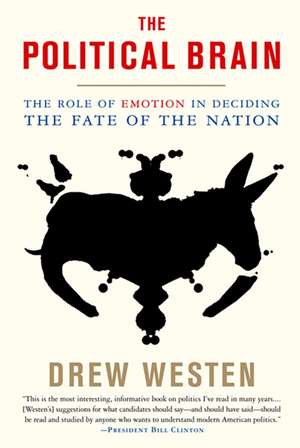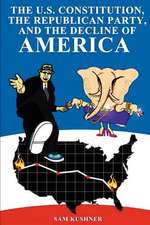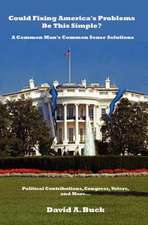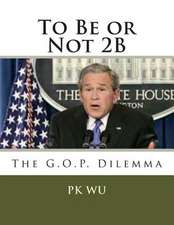The Political Brain: The Role of Emotion in Deciding the Fate of the Nation
Autor Drew Westenen Limba Engleză Paperback – 5 mai 2008
The
Political
Brainis
a
groundbreaking
investigation
into
the
role
of
emotion
in
determining
the
political
life
of
the
nation.
For
two
decades
Drew
Westen,
professor
of
psychology
and
psychiatry
at
Emory
University,
has
explored
a
theory
of
the
mind
that
differs
substantially
from
the
more
"dispassionate"
notions
held
by
most
cognitive
psychologists,
political
scientists,
and
economists—and
Democratic
campaign
strategists.
The
idea
of
the
mind
as
a
cool
calculator
that
makes
decisions
by
weighing
the
evidence
bears
no
relation
to
how
the
brain
actually
works.
When
political
candidates
assume
voters
dispassionately
make
decisions
based
on
"the
issues,"
they
lose.
That's
why
only
one
Democrat
has
been
re-elected
to
the
presidency
since
Franklin
Roosevelt—and
only
one
Republican
has
failed
in
that
quest.
In
politics,
when
reason
and
emotion
collide,
emotion
invariably
wins.
Elections
are
decided
in
the
marketplace
of
emotions,
a
marketplace
filled
with
values,
images,
analogies,
moral
sentiments,
and
moving
oratory,
in
which
logic
plays
only
a
supporting
role.
Westen
shows,
through
a
whistle-stop
journey
through
the
evolution
of
the
passionate
brain
and
a
bravura
tour
through
fifty
years
of
American
presidential
and
national
elections,
why
campaigns
succeed
and
fail.
The
evidence
is
overwhelming
that
three
things
determine
how
people
vote,
in
this
order:
their
feelings
toward
the
parties
and
their
principles,
their
feelings
toward
the
candidates,
and,
if
they
haven't
decided
by
then,
their
feelings
toward
the
candidates'
policy
positions.
Westen turns conventional political analyses on their head, suggesting that the question for Democratic politics isn't so much about moving to the right or the left but about moving the electorate. He shows how it can be done through examples of what candidates have said—or could have said—in debates, speeches, and ads. Westen's discoveries could utterly transform electoral arithmetic, showing how a different view of the mind and brain leads to a different way of talking with voters about issues that have tied the tongues of Democrats for much of forty years—such as abortion, guns, taxes, and race. You can't change the structure of the brain. But you can change the way you appeal to it. And here's how…
Westen turns conventional political analyses on their head, suggesting that the question for Democratic politics isn't so much about moving to the right or the left but about moving the electorate. He shows how it can be done through examples of what candidates have said—or could have said—in debates, speeches, and ads. Westen's discoveries could utterly transform electoral arithmetic, showing how a different view of the mind and brain leads to a different way of talking with voters about issues that have tied the tongues of Democrats for much of forty years—such as abortion, guns, taxes, and race. You can't change the structure of the brain. But you can change the way you appeal to it. And here's how…
Preț: 96.88 lei
Nou
Puncte Express: 145
Preț estimativ în valută:
18.54€ • 19.41$ • 15.34£
18.54€ • 19.41$ • 15.34£
Carte disponibilă
Livrare economică 15-29 martie
Livrare express 01-07 martie pentru 29.43 lei
Preluare comenzi: 021 569.72.76
Specificații
ISBN-13: 9781586485733
ISBN-10: 1586485733
Pagini: 496
Dimensiuni: 140 x 208 x 38 mm
Greutate: 0.47 kg
Ediția:New.
Editura: PublicAffairs
Colecția PublicAffairs
ISBN-10: 1586485733
Pagini: 496
Dimensiuni: 140 x 208 x 38 mm
Greutate: 0.47 kg
Ediția:New.
Editura: PublicAffairs
Colecția PublicAffairs
Notă biografică
Drew Westen received his B.A. at Harvard, an M.A. in Social and Political Thought at the University of Sussex (England), and his Ph.D. in Clinical Psychology at the University of Michigan, where he subsequently taught for six years. For several years he was Chief Psychologist at Cambridge Hospital and Associate Professor at Harvard Medical School. He is a commentator on NPR's "All Things Considered" and lives in Atlanta.
Descriere
The Political Brain is a groundbreaking investigation into the role of emotion in determining the political life of the nation. For two decades Drew Westen, professor of psychology and psychiatry at Emory University, has explored a theory of the mind that differs substantially from the more "dispassionate" notions held by most cognitive psychologists, political scientists, and economists—and Democratic campaign strategists. The idea of the mind as a cool calculator that makes decisions by weighing the evidence bears no relation to how the brain actually works. When political candidates assume voters dispassionately make decisions based on "the issues," they lose. That's why only one Democrat has been re-elected to the presidency since Franklin Roosevelt—and only one Republican has failed in that quest. In politics, when reason and emotion collide, emotion invariably wins. Elections are decided in the marketplace of emotions, a marketplace filled with values, images, analogies, moral sentiments, and moving oratory, in which logic plays only a supporting role. Westen shows, through a whistle-stop journey through the evolution of the passionate brain and a bravura tour through fifty years of American presidential and national elections, why campaigns succeed and fail. The evidence is overwhelming that three things determine how people vote, in this order: their feelings toward the parties and their principles, their feelings toward the candidates, and, if they haven't decided by then, their feelings toward the candidates' policy positions.
Westen turns conventional political analyses on their head, suggesting that the question for Democratic politics isn't so much about moving to the right or the left but about moving the electorate. He shows how it can be done through examples of what candidates have said—or could have said—in debates, speeches, and ads. Westen's discoveries could utterly transform electoral arithmetic, showing how a different view of the mind and brain leads to a different way of talking with voters about issues that have tied the tongues of Democrats for much of forty years—such as abortion, guns, taxes, and race. You can't change the structure of the brain. But you can change the way you appeal to it. And here's how…
Westen turns conventional political analyses on their head, suggesting that the question for Democratic politics isn't so much about moving to the right or the left but about moving the electorate. He shows how it can be done through examples of what candidates have said—or could have said—in debates, speeches, and ads. Westen's discoveries could utterly transform electoral arithmetic, showing how a different view of the mind and brain leads to a different way of talking with voters about issues that have tied the tongues of Democrats for much of forty years—such as abortion, guns, taxes, and race. You can't change the structure of the brain. But you can change the way you appeal to it. And here's how…






















